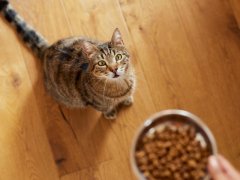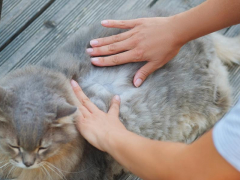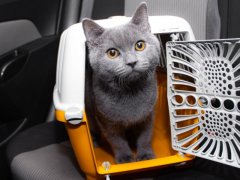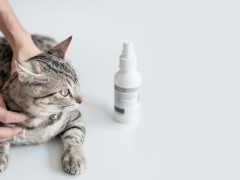
Vitamin B12, also called cyanocobalamin, is a water soluble vitamin that is often supplemented in cats with certain health conditions, especially of the GI tract. In this article, you’ll learn why B12 is important, situations when a vitamin B12 supplement is needed, and some frequently asked questions.
Vitamin B12 for Cats Overview

About Vitamin B12 for Cats
Vitamin B12, or cyanocobalamin or just cobalamin (going forward, we’ll use all three terms interchangeably), is required for many enzymatic processes in animals that are needed for normal cell growth and function, including protein synthesis, nerve conduction, metabolism of fats and carbs, and generation of new red blood cells.
In a natural sense, B12 can only be obtained from a diet that includes meat, eggs, and poultry. As obligate carnivores, cats require certain nutrients from muscle tissue protein, including B12 and taurine.
For cats, obtaining B12 adequately from their diet is generally not a problem. In humans, B12 deficiencies are seen more commonly in people consuming a vegetarian or vegan diet who are not supplementing enough B12.
Deficiencies in B12 can cause a host of abnormal signs. According to Harvard Medical School, people with cobalamin deficiency may experience subtle but unusual and progressive signs of illness, including strange tingling or numb sensations, difficulty walking, cognitive and memory issues, and weakness.
In cats, we often find that issues of the digestive system go hand in hand with B12 deficiencies. This is because like all other cells, intestinal cells require B12 for regeneration and health.
Also Read: The 7 Best Cat Vitamins And Supplements
What Does Vitamin B12 Do for Cats?
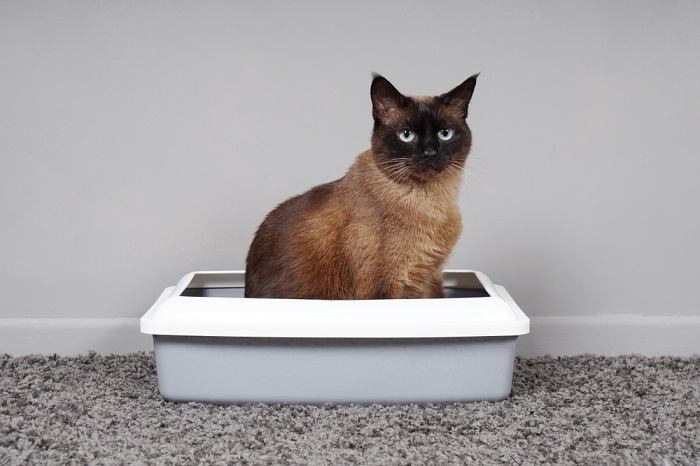
Cats with gastrointestinal disease might suffer from vitamin B12 deficiency.
In cats, vitamin B12 deficiency is seen most often with an inflammatory disease of the bowel. This may be true inflammatory bowel disease (IBD) or may also be gastrointestinal low grade lymphoma. In these conditions, bowel thickening and inflammation leads to poor absorption of nutrients and weight loss.
B12 is poorly absorbed in these conditions, like other nutrients, but its deficiency from poor absorption also contributes to further negative changes in intestinal health.
According to an article about cobalamin deficiency in Tufts University’s catnip newsletter, people with cobalamin deficiency also experience changes with intestinal permeability and absorptive function.
Studies have shown that supplementing cobalamin in deficient cats experiencing gastrointestinal disease, like vomiting and diarrhea, has led to a significant improvement in GI signs, as well as weight gain.
It remains a phenomenon as well, that even if you treat a cat for a disease like IBD with steroids or immunosuppressant medication and a prescription diet, their response will never be as full or complete unless B12 supplementation is also included.
Also Read: 10 Subtle Signs Your Cat May Be Sick
Side Effects of Vitamin B12 for Cats
Fortunately, vitamin B12 is extremely safe. As a water-soluble vitamin, any excesses the body does not need are simply excreted in the urine. This is unlike fat soluble vitamins, like vitamins A, D E, and K, which will continue to get stored in the body’s fat when supplemented excessively, and can lead to side effects if over supplemented beyond the body’s needs.
Though uncommon, vitamin B12 may sting a little on injection, though this is usually a short-lived side effect. This is also more common for hydroxocobalamin, a form that is used less commonly in veterinary medicine.
Also Read: Top 10 Things Your Vet Wishes You Knew
Vitamin B12 for Cats Dosage
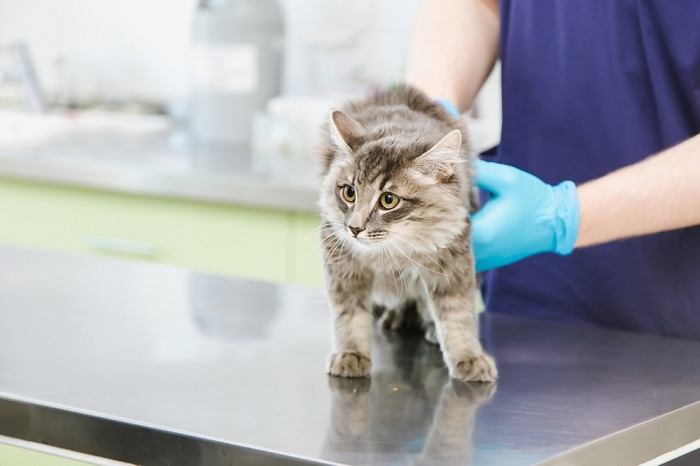
Cats with inflammatory bowel disease initially receive an injection of vitamin B12 once a week for six weeks.
Dosage recommendations differ depending on whether an injectable or oral form of vitamin B12 is being used.
In cats, it is most common for B12 to be supplemented by a subcutaneous injection under the skin. For cats with inflammatory bowel disease, the most common recommended schedule for B12 injections is to give 250 micrograms per cat once a week for six weeks.
Most cyanocobalamin is provided at a 1000 microgram/milliliter concentration, so this often equates to 0.25ml. However, it does come in higher concentrations, so always be aware of what you have if giving at home.
After the initial six weeks, the injections can be tapered down to being given less frequently, often once every one to two months. This is because though cobalamin will take a couple of weeks to reach appropriate levels in the body, especially if deficient, it can last in the body for a long time once it reaches appropriate concentrations.
The injections given under the skin may be performed as a service at your veterinary practice. Pet owners might also be comfortable giving the injections at home, after a brief demo by a veterinary professional.
If you do the injections at home, it can be best to do them while your cat is calm or distracted, such as during a meal. Because the injections are given infrequently with a very small needle (typically a 25-gauge needle is adequate), this is not usually a very unpleasant experience for the cat.
If doing injections at home, always remember to properly dispose of any needles and syringes in a sharps container or well-sealed heavy plastic container. Check with your veterinarian for the best methods of disposing containers containing sharps in your area.
Also Read: How To Give Subcutaneous Fluids To A Cat
Vitamin B12 also comes in oral forms. Cobalequin made by Nutramax is a cyanocobalamin chewable tablet supplement formulated for dogs and cats, that comes in a 250 microgram size. Oral supplementation of B12, unlike the injection, must be given every day. The initial loading period for the oral form is also longer, lasting 12 weeks.
Cobalamin blood levels can be monitored, and many veterinarians prefer to check these levels at the time of diagnosis for GI disease, as well as periodically during treatment, to determine if B12 levels are remaining normal. This is especially the case after the loading period is finished, to help determine the right frequency thereafter.
A majority of cats that require B12 supplementation, especially for GI disease, will require therapy for life.
Also Read: How To Give Your Cat A Pill (With 7 Proven Tips!)
In Summary
Vitamin B12 (cyanocobalamin or cobalamin) is a crucial vitamin for many of the body’s everyday processes, and deficiencies can contribute to serious disease. In cats, deficiencies are often linked to gastrointestinal disease, especially inflammatory bowel disease and lymphoma.
B12 supplementation is very safe and side effects are very rare, but supplementation is often required for life.
Drug Dosing Disclaimer: We are only able to provide doses for medications that are FDA approved for use in cats and only as the label guidelines dictate. For medications that are used off-label we can only provide guidelines and safety information for use. Safe and appropriate dosing for off-label medications can only be determined by a primary care veterinarian.
We encourage you to work with your veterinarian to determine if a particular medication is appropriate for your cat. Changing or adjusting a dose for your cat on your own without consulting with a veterinarian can carry risk. We do not encourage use of medications prescribed for human use in pets without first consulting with a primary care veterinarian.
